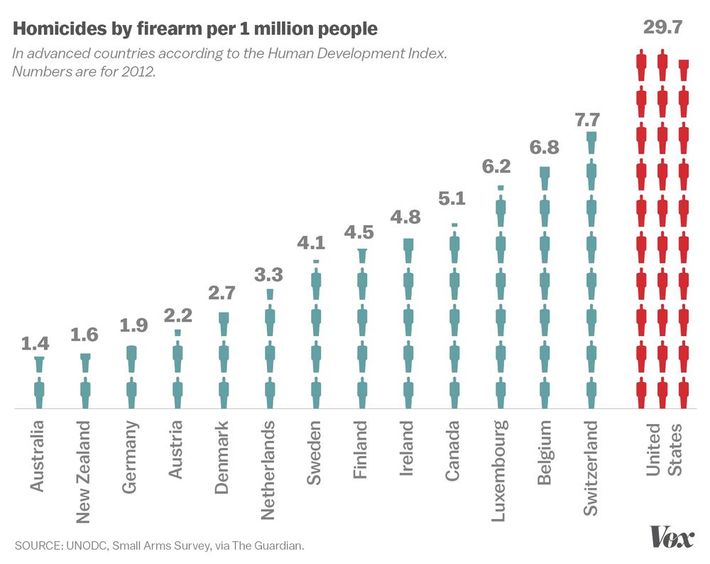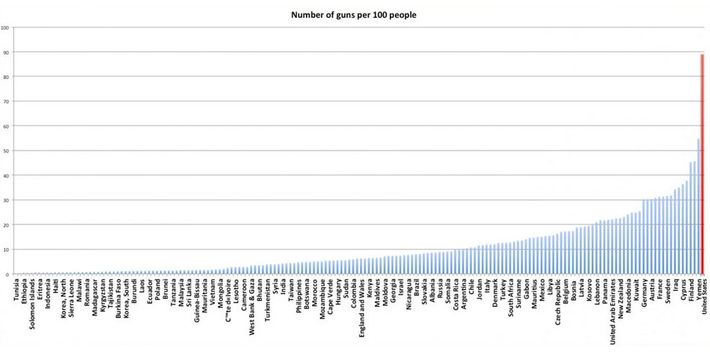
On Thursday morning, the president delivered a speech about gun violence without ever uttering the word “gun.” By the time Donald Trump began his remarks, America had suffered 18 school shootings in 44 days, and more than 300 mass shootings since the start of his presidency. But this broader context also went unmentioned. Instead, Trump focused his address narrowly on Wednesday’s massacre at a high school in Parkland, Florida, and the need for “healing” in its wake. The president spoke of God and prayers and love. He promised to “tackle the difficult issue of mental health” (an endeavor that apparently requires, in Trump’s estimation, draconian cuts to federal spending on mental-health care).
And then, he delivered one of the most Orwellian lines of this most-Orwellian presidency.
“It is not enough to simply take actions that make us feel like we are making a difference,” Trump said. “We must actually make that difference.”
In a speech devoid of references to firearms — and delivered by a vehement opponent of all forms of gun control — the implication of these sentences was unmistakable: Some may have a superstitious belief that mass shootings can be prevented by restricting access to guns, but those who care about evidence-based policy-making know that doesn’t work.
This is, of course, the opposite of the truth. The Trump GOP’s approach to issues of public safety is defined by its dedication to privileging policies that make conservatives feel secure in their worldview over ones that would actually make them secure in their communities.
The cause of our nation’s epidemic of gun violence is neither complicated nor mysterious. The United States is home to 4.4 percent of the world’s humans — and nearly half of all its civilian-owned guns. Since 2015 there have been more privately held firearms than people in the United States. No other country has anything resembling that density of gun ownership (not even failed states wracked by perpetual civil war) — and no other developed country has anything resembling our gun-homicide rate.


Common sense would suggest that these two facts are related. And mountains of empirical research have confirmed that intuition. Within our nation’s borders, states with more guns suffer more gun homicides; within those states, regions with more guns suffer more gun homicides; within those regions, households with more guns suffer more gun homicides and suicides.
The particular tragedy that struck Florida on Wednesday was likely the product of myriad social pathologies. It is possible that in a country with just as many guns as ours — but with better systems of education and mental health; or a less cutthroat economic system and more generous welfare state; or a less troubled racial history and stronger sense of social solidarity; or a less toxic ideal of masculinity and more women in positions of power, Nikolas Cruz wouldn’t have turned Marjory Stoneman Douglas High School into a war zone this week.
But it is a certainty that if our gun-ownership rate was comparable to that of our peers in the developed world, we could remain every bit as messed up as we are today, and still witness far fewer atrocities like the one Cruz perpetrated. Human beings are, ultimately, just highly intelligent apes. We’re all subject to fleeting impulses and patterns of thought that are unwise and uncontrollable. Surround enough of us with tools that can turn temporary moods into irrevocable violence, and you’re going to get a lot of irrevocable violence. In most cases, that violence will take the form of suicide; in a few, it will take the form of mass murder.
Alas, for all their claims to Christianity, many conservative voters do not like to think of themselves as flawed and humble creatures — but rather, as temporarily embarrassed action heroes. Guns don’t make Republicans safe. But they do make many feel safe. And so, the Republican Party staunchly opposes all effective means of preventing the United States from suffering mass shootings on a near-daily basis, and gun homicides and suicides far more often than that.
It is true that even Democrats refuse to propose the most effective policies for curbing our epidemic — like, for example, a mandatory buyback program for all semi-automatic and automatic weapons. But more modest reforms, while insufficient for bringing the U.S. into the realm of normality on gun deaths, can nonetheless save significant numbers of lives. As Vox’s Dylan Matthews notes:
• After Connecticut passed a law requiring gun purchasers to first obtain a license, gun homicides fell by 40 percent and suicides fell by 15.4 percent.
• When Missouri repealed a similar law, gun homicides increased by 23 percent and suicides increased by 16.1 percent.
• Both firearm homicides and overall homicides are lower in states that check for restraining orders (13 percent fewer firearm homicides) and fugitive status (21 percent fewer) before selling guns, and firearm/overall suicides are lower in states that check for fugitive status (5 percent fewer), misdemeanors (5 percent fewer), and mental illness (4 percent fewer).
• The national assault weapons ban did not decrease gun deaths in the U.S., though if it had existed longer it might have made certain shootings less lethal. The end of the assault weapon ban did meaningfully increase homicides in Mexico.
But none of those reforms flatter the Republican worldview; and so Republican politicians — including those who preach the supreme importance of law and order and national security — will fight tooth and nail to prevent their passage.
And this commitment to protecting conservatives’ security in their ideological beliefs — even when doing so undermines public safety — extends beyond issues of gun regulation.
Since 9/11, right-wing extremists have murdered 70 Americans on U.S. soil. For most of the past decade, such extremists were killing more Americans annually than Islamist terrorists were. All but three of those killed by far-right terrorists since 2001 lost their lives after Barack Obama’s election — a surge anticipated by a 2009 report from the Department of Homeland Security.
In that analysis, DHS warned that the combination of a weak economy and an African-American president was spurring a wave of white-supremacist radicalization, which had made “lone wolves and small terrorist cells embracing violent right-wing extremist ideology” into “the most dangerous domestic terrorism threat in the United States.”
But this claim made conservatives feel ideologically insecure. So they forced DHS to withdraw the report; and two years later, the Washington Post revealed that the analytical team behind it had been “effectively eviscerated.”
The Trump administration has continued this policy of putting (right-wing) political correctness above counterterrorism. Shortly after taking office, the president cancelled a $400,000 grant to Life After Hate, a nonprofit dedicated to de-radicalizing white nationalists and other right-wing extremists. This move came amid an effort to refocus the Countering Violent Extremism program (which had historically worked to counter propaganda and recruitment from terrorist groups of all stripes) exclusively on combating Islamist extremism.
The victims of a public-safety regime that privileges the right’s feelings over empirical reality aren’t limited to those memorialized in gun-homicide statistics, or Southern Poverty Law Center reports; the lives that we fail to save in deference to conservative ideology are dwarfed by those we actively sacrifice on its altar.
Reasonable people can disagree about how the state should balance the imperatives of promoting public safety and preserving civil liberties. But the balance we have decided to strike on these issues is incoherent and homicidal. We have concluded that preventing acts of mass violence on U.S. soil isn’t important enough to restrict access to assault weapons — but that this goal is, nonetheless, vital enough to justify turning away tens of thousands of Syrian refugees on the baseless suspicion that welcoming them will increase the frequency of such attacks; and that the mass murder of 58 concertgoers by an apolitical white man is an event unworthy of any policy response whatsoever — but the prospect of politically motivated Muslims committing similar atrocities is such an existential threat, it is worth overthrowing sovereign governments, killing more than 1 million foreign civilians, and investing trillions of American dollars in an indefinite, global war aimed at extinguishing every last radical Islamist who might have even daydreamed about committing such an attack.
Both parties are responsible for perpetuating this insane state of affairs. Conservatives are not the only voters who struggle to accurately weigh risks; Republicans aren’t the only politicians who shape policy around the public’s prejudices, instead of empirical realities. But the center-left’s sins on this front are rooted in cowardice; the right’s, in quasi-religious conviction.
The security that (much of) the Republican base longs for cannot be won through measures that lower the crime rate or deter terrorism — but only through policies that affirm their faith in a world divided between the righteous, who look like us, and the wicked, who look like them; between God’s people and the barbarians; Judeo-Christian civilization and the Muslim hordes; the good guy with a gun, and the bad guy with a gun.
It is not enough to take actions that actually make a difference. We must actually feel that we are different, that evil is a quality unique to alien others. And if we can just keep them behind a wall, and a gun beneath our pillows, we will always know who we are; and that we are good; and that we are safe.






























